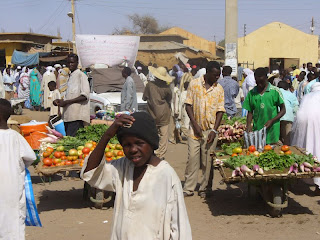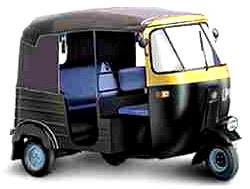The Chadian conflict continues to rage on but with no news headlines and with even fewer witnesses, but we are feeling the repercussions here in
 gun) roaming about town. Both government and SLA-M forces (the only signatory to the now almost defunct peace agreement) regularly cruise the market area in their vehicles and conduct what I assume are armed patrols on foot. To make a point, I should explain that they are all very cordial and never really interact with the population, which is a far better scenario than in
gun) roaming about town. Both government and SLA-M forces (the only signatory to the now almost defunct peace agreement) regularly cruise the market area in their vehicles and conduct what I assume are armed patrols on foot. To make a point, I should explain that they are all very cordial and never really interact with the population, which is a far better scenario than in  them. At least in El Fasher and Nyala there are barracks and some division between civilian and military is respected. This is an important point to make because in many African countries in conflict, the government does not provide consistent support to its army; and so on top of the armed conflict between adversaries you also have regular clashes between civilians and the police and military. A culture of predation sets in that creates a confused web of conflict that then becomes difficult to untangle from the original conflict. Peace processes lose their way, and most importantly, lose popular support.
them. At least in El Fasher and Nyala there are barracks and some division between civilian and military is respected. This is an important point to make because in many African countries in conflict, the government does not provide consistent support to its army; and so on top of the armed conflict between adversaries you also have regular clashes between civilians and the police and military. A culture of predation sets in that creates a confused web of conflict that then becomes difficult to untangle from the original conflict. Peace processes lose their way, and most importantly, lose popular support.
But I digress.
We pulled our taxi to one side to allow the column of military trucks to pass and, after checking in with the UN security office to make sure that the market area was safe, I proceeded to my first meeting of the day. Not two minutes after arriving there, a long column of tanks began to enter the city center. People ran to the streets to watch the 20 or more huge Soviet style tanks roll through with men wearing red bandanas, and waving Sudanese flags and flowers over their heads. “They are returning from Geneina,” a smiling spectator told me. People cheered them o n and showed the “number one” symbol and the joyful soldiers replied in kind. As we both watched this seemingly endless column of vehicles, the same onlooker turned to me and said, “War is horrible and we want this fighting to stop. We hope they are back to stay.” Not two minutes after making this point, he is waving the “number one” symbol again as another tank rolls into view, this one covered in soldiers singing military songs and dancing. One soldier nearly falls off his tank, but still manages to regain his composure and join again in the revelry.
n and showed the “number one” symbol and the joyful soldiers replied in kind. As we both watched this seemingly endless column of vehicles, the same onlooker turned to me and said, “War is horrible and we want this fighting to stop. We hope they are back to stay.” Not two minutes after making this point, he is waving the “number one” symbol again as another tank rolls into view, this one covered in soldiers singing military songs and dancing. One soldier nearly falls off his tank, but still manages to regain his composure and join again in the revelry.
Quite a sight.
It is standard for all NGOs to consult the UN for information about the security situation to ensure the safety of their staff. But when we consulted the UN for some information about what had been happening in town, their response was predictable.
"Nothing to report."
They did not even come to the weekly OCHA meeting later that afternoon because of the lack of relevant security matters to discuss.
Two days later, we all heard the press reports of a large assault on towns north of Geneina (click on the blue text to go the article) and of the arrival of fresh troops in the same area preparing for a sustained attack on the areas abandoned by the Sudanese rebels who had left their hard-fought positions in West Darfur to help their alleged benefactor, President Idriss Deby of Chad, to stay in power. Having abandoned those key positions and leaving the civilian populations totally unprotected, the rebel controlled areas are experiencing a great deal of chaos. Over 15,000 civilians fled the area and crossed in
None of the fighting has directly affected our safety but it does create an unsettling feeling among most international nongovernmental organizations here, especially those who were hoping to start doing early recovery work in settled villages where people have been trying to rebuild. It is very difficult to get a community to start to think about rebuilding, if they believe that there is chance that war will return to their village. So, although the fighting is still hundreds of kilometers away, we can still see its repercussions in the psyche and emotions of the people of North and
We have made adjustments to my living and working situation and I will soon have regular access to the internet in both Nyala and El Fasher, so that is a relief. I should be able to make more regular entries and try to include more descriptions of my environment in El Fasher. I will leave you with this thought.
Recycling the desertEl Fasher and Nyala are towns in the middle of the desert. And things do not decompose very quickly in the desert. I have had to try to find a way to decrease my carbon footprint in this mission by finding creative ways of deposing of my trash. I asked around about any recycling program, and Sudanese just look at me like I am crazy. “We just burn it,” is the usual reply. I began to resign myself to doing the same until I saw this kid collecting plastic bottles in one town, a man collecting scrap metal, and another kid sorting his trash into organic and non-organic material. I managed to follow the scrap metal man to a factory that transforms the scrap into cooking pots and utensils but I still do not know what the kids do with their trash. I personally, think that it would make a very worthwhile side project that perhaps I could encourage you my readers to send ideas and materials on desert recycling and eventually possibly financial support to help these entrepreneurs to create a more formal recycling business.
Trash is a huge source of income in this environment but it has been undervalued for obvious reasons. For inspiration I encourage all of you to watch this film about recycling in
Maa’a Salaama


















